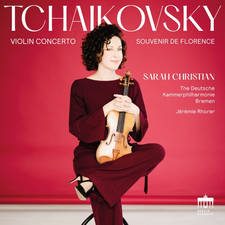The Full Works Concert - Wednesday 12 March 2014
Tonight's Concert opens with Tchaikovsky's Romeo and Juliet, and moves through centuries of classical masterpieces.
In the spring of 1721, Bach was contemplating changing jobs and, after a chance meeting with the Margrave of Brandenburg, Bach sent him a set of six concertos that he had already written - possibly as a kind of audition. The Margrave appears to have completely ignored the gift and the set were discarded in his library until his death in 1734. They were found in the Brandenburg archives during the 19th century. Tonight we'll hear the third of Bach's Brandenburg Concertos.
Tchaikovsky's famous Romeo and Juliet Fantasy Overture is based on three main strands of the Shakespeare story. The first represents the saintly Friar Laurence. The second agitated theme evokes the warring families, including a reference to a sword fight, depicted by crashing cymbals. Thirdly, the love theme for Romeo and Juliet is passionate and yearning in character but always with an underlying current of anxiety.
The premieres of many works are often described as having wowed the audience of the day, but this simply does not do justice to the response Paganini received when his Violin Concerto No.1 was performed for the first time. Those who heard it were absolutely blown away - not just by the technical feats and showmanship Paganini had demanded of the instrument, but by the fact that he was actually able to play every single note. And these weren’t just notes: there were giant leaps, packed with all sorts of complex musical wizardry, the like of which no one had ever heard before.
Nothing is known about the scenario for Hummel's ballet music, The Magic Castle. The brevity and multi-sectioned nature of the piece suggests that it may have been a ballet for children, or perhaps intended as light relief from a more serious work. Hummel’s orchestra is unusually large, with two of each of flutes, oboes, clarinets, bassoon and horns together with three trumpets.
Shostakovich wrote his second Piano Concerto for his son Maxim. On 10 May 1957 - Maxim's 19th birthday - he was the soloist at the premiere performance in the Great Hall of the Moscow Conservatory, where he was still a student. It was a huge success and reached an entirely new audience when it became the basis of Sir Kenneth MacMillan's plotless ballet, Concerto, which became part of the Royal Ballet's repertoire.
Johann Sebastian Bach: Brandenburg Concerto No.3 in G major BWV.1048
John Eliot Gardiner conducts the English Baroque Soloists
Peter Ilich Tchaikovsky: Romeo and Juliet
Gustavo Dudamel conducts the Simon Bolivar Youth Orchestra of Venezuela
Niccolo Paganini: Violin Concerto No.1 in D major Opus 6
Violin: Yehudi Menuhin
Alberto Erede conducts the Royal Philharmonic Orchestra
Johann Nepomuk Hummel: The Magic Castle - Ballet Suite
Howard Shelley conducts the London Mozart Players
Dmitri Shostakovich: Piano Concerto No.2 in F major Opus 102
Piano: Denis Matsuev
Trumpet: Timur Martynov
Valery Gergiev conducts the Orchestra of the Mariinsky Theatre











